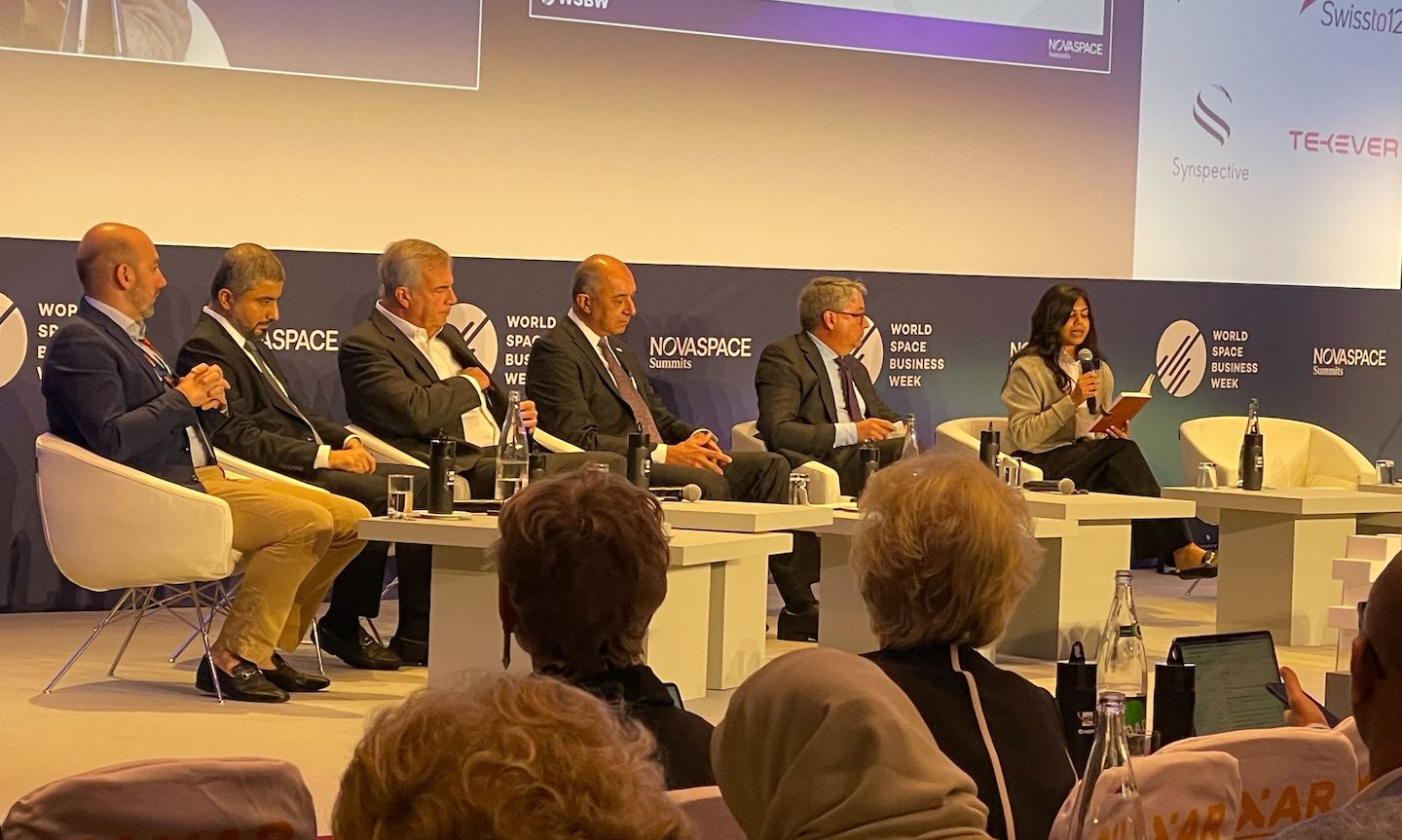Latest News

Satellite leaders size up the D2D market at WSBW in Paris. Photo: Via Satellite
PARIS — The direct-to-device (D2D) market has been the subject of excitement and hype in the satellite industry in the past few years, with the promise of expanding satellite’s market share and offering connectivity to phones and devices everywhere.
It’s early days for this market, as Apple was an early-mover in offering the service to customers. Other device manufacturers and mobile network operators (MNOs) like Google and Verizon have recently signed deals with satellite companies.
Speaking at World Space Business Week in Paris, Scott Wisniewski, president of AST SpaceMobile, said that while some view D2D as a risky market, he believes market evidence suggests otherwise.
“The consumer wants to be connected all the time. The phone dominates our life,” Wisniewski said. “We want to build a purpose-built network for cellular broadband. We are focused on being first. I think it is short-sighted to say people won’t pay for this connectivity. The telcos believe in it. People say it is a risky strategy, but we got investment from the likes of Google, Vodafone, AT&T and Verizon. We think there is a really big market to create here.”
Wisniewski spoke just days after SpaceX launched the first five commercial satellites for AST SpaceMobile. The company has signed deals with 45 mobile network operators to provide service in the future to billions of subscribers, including a $100 million commitment with Verizon in May. He said AST SpaceMobile will be rolling out services with partner MNOs as it rolls out the network. He believes competition will decide which network will ultimately find favor with customers.
George Giagtzoglou, vice president of Strategy for Omnispace, agreed that customers will be willing to pay for this type of service. Omnispace is also looking to partner with MNOs to ensure that MNOs can offer these services in a way that limits their capital expenditure. Giagtzoglou says Omnispace sees “a very, very large market” for these services, citing a recent GSMA study.
“We were surprised how prevalent this type of solution is to customers. Users are prepared to pay a premium for always-on services. This is why mobile operators are excited,” he said. “This could increase mobile operators revenues by 2% to 3%, which is huge for them. It could also have an impact of churn reduction. This has the potential of reducing CapEx and OpEx but still offering an ‘always-on’ service.”
Apple’s deal with Globalstar was a key kickstarter for this market. While Apple started out by offering emergency messaging and access to emergency services, it is expanding satellite messaging to regular messaging when users are outside of cellular networks.
Barbee Ponder, general counsel and vice president of Regulatory Affairs for Globalstar, said that Globalstar is starting to look at other features as it continues to make its presence felt in the market. While the initial service with Apple was rolled out in the U.S., it is gradually rolling this out in other markets too. However, Globalstar wants to do more.
“We are going to invest, innovate, evolve and support the expansion of additional D2D services in the future. We are working as fast we can to bring D2D to as many regions as possible,” Ponder said.
Iridium CEO Matt Desch said Iridium’s approach to this market is “complementary” to what AST SpaceMobile is doing. He described what Iridium is doing as “the glue” considering Iridium enables direct messaging from the oceans and the sky, for example.
Iridium previously worked with Qualcomm for a satellite-enabled chip, but Qualcomm pulled out of the partnership when Android manufacturers didn’t adopt the chip. Earlier this year, Iridium pivoted its strategy, previewing a “Project Stardust” — an upcoming 3GPP compliant D2D service for smartphones and IoT devices that operates on Iridium’s existing network.
Desch cautioned on the size of this market. “I don’t know how big the market will be. None of us know the size of the market, the willingness to pay, where it will be licensed,” he said. “But, it will all be incremental revenue [for Iridium]. If services work well and are positioned correctly, they will work well, starting with emergency services. The important part for us will be things like emergency messaging.”
Like Wisniewski, Desch believes companies will be successful if they hit the sweet spot in terms of service and cost. He added, “If you have the best service, you will take marketshare. Customers will decide which will be the best. The real focus is being on the best network.”
Yahsat, soon to be Space42, a new AI-powered space company, formed out of the merger of Yahsat and Bayanat is another interesting player here, thanks to its earlier acquisition of Thuraya.
Ali Al Hashemi, CEO of Yahsat spoke of how the company is looking to develop a Low-Earth Orbit (LEO) capability to enhance its services here. Like Iridium, it is looking to play in the IoT market, and develop solutions.
Stay connected and get ahead with the leading source of industry intel!
Subscribe Now